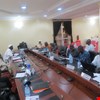


Within the framework of IDMP implementation, GWPEA has started the process of documenting and sharing the knowledge about good case studies on drought resilience the Horn of Africa, in selected countries including Uganda, Kenya and Ethiopia

The third and final “Climagine” consultation workshop was organised by the Global Water Partnership – Mediterranean (GWP-Med), in the framework of the regional ClimVar Project “Integration of the Climate Variability and Change Impacts in the Integrated Coastal Zones Management National Strategies”, through two consecutive consultations, one in the archipelago of Kerkennah in Southern Tunisia, on July 28th, 2015 and one in Tunis the day after, both with more than 25 participants from key organisations involved in Tunisia and Kerkennah’s coastal management.

The Global Water Partnership – Mediterranean (GWP-Med) has established a formal agreement with the Department for Planning and Conservation of Agricultural Lands at the Tunisian Ministry of Agriculture towards integrating climate change considerations in water and soil conservation planning, under the WACDEP (Water, Climate & Development) Programme; and in this context, it has entered a very fruitful collaboration with the Ministry, as well as the Regional Department for Agriculture in Bizerte, in Tunisia’s North, using the Douimis Basin in the Bizerte Region as a pilot for the development of the climate change mainstreaming methodology.

“I consider myself very fortunate to have spent the last 6 years as the Chair of the Technical Committee. The Committee should be seen as the stable backbone of GWP,” says Dr. Mohamed Ait-Kadi in a farewell interview.

The Caribbean Water and Wastewater Association (CWWA), the Global Water Partnership-Caribbean (GWP-C) and the United Nations Environment Programme Caribbean Regional Coordinating Unit (UNEP CAR/RCU) through the Global Environment Facility - funded Caribbean Regional Fund for Wastewater Management (GEF CReW) Project hosted the 11th Annual High Level Forum (HLF) of Caribbean Ministers responsible for Water on August 27th and 28th, 2015 in Miami, Florida.
In order to examine and internalize the High Level Panel of Experts (HLPE)’s report on Water for Food Security and Nutrition (FSN), GWPEA facilitated on 11th August, the Ethiopian national consultation group workshop.

From the 7th to 10th September, 2015 was held in N’djamena, Chad a training workshop for staff and experts of the Lake Chad Basin Commission (LCBC) on IWRM for transboundary water resources management.
Organized by the Department of Natural Resources Management of the LCBC in collaboration with GWP Central Africa (GWP CAf), the workshop brought together fifteen participants from the secretariat of the LCBC.
The objective was to strengthen their understanding of the IWRM concept and its principles, and also develop their capacity in using some specific IWRM planning tools with a special focus on development and management of transboundary water resources. It also aimed at ensuring a common understanding of the concepts, principles and planning process of IWRM among key staff of the LCBC secretariat.

GWPEA in collaboration with CapNet and Uganda National Water and Sewage Corporation organized a five days training for Young Water Professionals on Integrated Water Resources Management (IWRM) and Climate change

On August 14, 2015, the GWP global Steering Committee approved the decision to appoint Prof. Eelco van Beek as Interim Chair of the GWP Technical Committee.

The Caribbean Institute for Meteorology and Hydrology (CIMH) will be offering online courses in GIS for Hydrological Technicians and Flood Hazard Mapping during the months of September and October 2015.